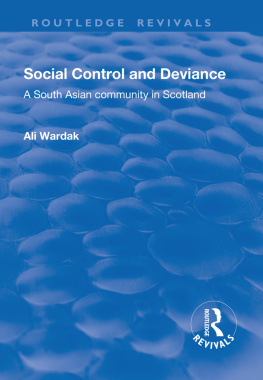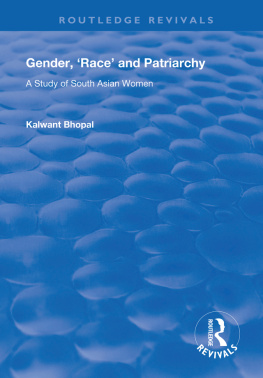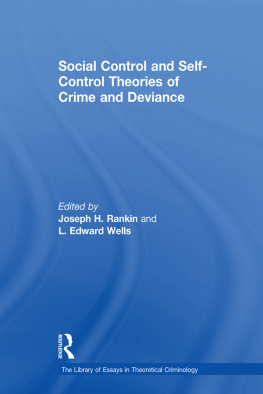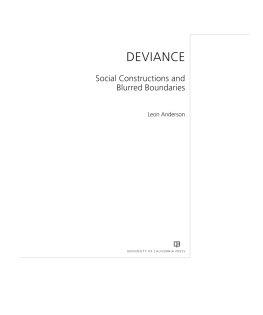SOCIAL CONTROL AND DEVIANCE
TO THE LIVING MEMORY OF MY BELOVED LATE PARENTS
ADAY AND GULDADA
Social Control and Deviance
A South Asian community in Scotland
Ali Wardak
University of Glamorgan
First published 2000 by Ashgate Publishing
Reissued 2018 by Routledge
2 Park Square, Milton Park, Abingdon, Oxon OX14 4RN
711 Third Avenue, New York, NY 10017, USA
Routledge is an imprint of the Taylor & Francis Group, an informa business
Copyright Ali Wardak 2000
All rights reserved. No part of this book may be reprinted or reproduced or utilised in any form or by any electronic, mechanical, or other means, now known or hereafter invented, including photocopying and recording, or in any information storage or retrieval system, without permission in writing from the publishers.
Notice:
Product or corporate names may be trademarks or registered trademarks, and are used only for identification and explanation without intent to infringe.
Publisher's Note
The publisher has gone to great lengths to ensure the quality of this reprint but points out that some imperfections in the original copies may be apparent.
Disclaimer
The publisher has made every effort to trace copyright holders and welcomes correspondence from those they have been unable to contact.
A Library of Congress record exists under LC control number: 00130585
ISBN 13: 978-1-138-71692-6 (hbk)
ISBN 13: 978-1-315-19679-4 (ebk)
I am very pleased to write this preface to a work that I witnessed in progress while the author and I were doctoral students under the supervision of Dr Peter Young at Edinburgh University. I fondly remember debating aspects of control theory (the framework of the book) with Dr Wardak as we walked from the university library in the early 1990s. I also remember him asking me the tricky question of what I considered the most important contribution to criminology in recent times and I remember how he smiled victoriously when I answered without hesitation that, without doubt, it was the development of gender awareness. He explained that he found my response amusing because, according to him, every doctoral student would identify the subject of his or her research as making the most important recent contribution to the field of knowledge. Needless to say, he was convinced that control theory was the best thing in criminology since sliced bread I am pleased to welcome Dr Wardak's book to the same series in which my own research on Black Women and the Criminal Justice System was published. Indirectly, the two books will hopefully continue our intellectually stimulating debates.
Dr Wardak's book, I am proud to say, illustrates the theoretically informed style of work encouraged by the Edinburgh University's Centre for Law and Society. The author brings to this theoretical awareness, a methodological sophistication that offers an innovative analysis of social control and deviance. The title of the book gives the misleading impression that the author would dwell on the official discourse of social control and deviance but he is more interested in the phenomenology of how the Pakistani community in Edinburgh inter-subjectively make sense of both social control and deviance. This approach is intriguing because criminologists often assume that the state and its agencies have a monopoly over the definition of social control and deviance. By approaching the subject-matter from below, the author indirectly illustrates the theoretical importance of studying subordinate perspectives on reality without falling into the criminological trap of focusing exclusively on criminality.
Perhaps the author avoided the crime-centred pre-occupation of criminologists because the Pakistani youth he studied were not remarkably crime-prone, in spite of the self-reported criminality by some of them. The question that this raises for some criminologists is a controversial one: If Pakistanis in Scotland are excluded and marginalized like Africans in Scotland, how come they are not arrested as frequently as Africans by the official social control agents. The author did not raise this question directly probably because the number of Africans in the Scottish crim inal justice system was not as large as their over-representation in England while Pakistanis appeared even more law abiding than the privileged native white people in both Scotland and England and Wales. It is a credit to the book that it is capable of provoking more research questions to be tackled in future works.
Other researchers who wish to follow-up on the implications of Dr Wardak's work could focus on non-migrant communities or on less peaceful ones. For example, the suggestion by control theory that those who are less committed to societal values, less involved in community rituals and less involved in religious observations would be more deviant could have a different interpretation if applied to troubled communities like Northern Ireland, The Kashmir Region or even to Mafia families with alternative notions of Izzetand Bizatti (honour and dishonour). Even when the Durkheimian collective conscience is not contentious, some researchers might wish to find out if there is anything that makes the Pakistani community in Edinburgh more capable of controlling deviance among its youth whereas the prisons in Pakistan are every bit as over-crowded as prisons everywhere in the world.
The author suggests that a possible explanation is that exclusionary practices by white employers have had the unintended consequence of making the Pakistani community more self-reliant and more likely to rely on self employment as shopkeepers. This is probably a clue to the role of class relations on social control and the perception of deviance among the Pakistani in Edinburgh whereas in Pakistan, the majority of the citizens are relatively impoverished and consequently demonized by the official law enforcement agencies in Pakistan. Again, this is not a point directly raised in the book but one that can be provoked by the findings analyzed by the author.
It would not have been possible for me to travel the thousands of miles from Afghanistan to Scotland to study at the University of Edinburgh without the help of a number of individuals and institutions. First of all, I am very grateful to my elder brother, Dr. A. Wali Wardak, who helped me in the procedural processes of getting admission to the University of Edinburgh and travelling to Scotland. I am also very grateful to my parents and to my younger brother, Engineer A. Basir Wardak, who through many difficult days, gave the strong moral support necessary for me to continue in my search for knowledge. The loss of both my parents in 1998, while I was working on publishing this research as a book deeply shocked me - a shock that I am yet to come to terms with. However, as I knew that my beloved A day and Guldada had always wanted me to be an academic and a writer, I was determined to complete publishing this book which I dedicate to their living memory that is deeply present in my conscience.
I have been very fortunate to be taught and supervised by distinguished scholars and academics and to have worked in the intellectually stimulating environment of the Centre for Law and Society, at the University of Edinburgh. I am especially very grateful to my supervisors Dr. Peter Young and the late Professor Frederick McClintock for their scholarly and invaluable supervision of my research. Dr. Peter Young particularly has been very kind in giving me considerable academic, social, and moral support in the various phases of my research. I express my deep gratitude to him and to his family. I also sincerely thank Dr. James Sheptycki for his supervision of this research while it was in its last stages of completion.






